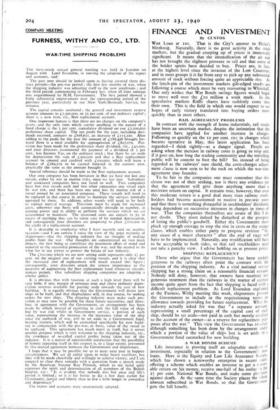FINANCE AND INVESTMENT
By CUSTOS WAR Loan at tot. That is the City's answer to Hitler's blitzkreig. Naturally, there is no great activity in the stock markets, but the gradual creeping up of prices is immensely significant. It means that the intensification of the air war has not brought the slightest pressure to sell and that some of the bolder spirits have decided to buy. Prices are, in fact. at the highest level since the invasion of the Low Countries, and in most groups it is far from easy to pick up any substantial amount of stock without forcing quite an appreciable rise. As the lynch-pin of the investment markets gilt-edged stocks are following a course which must be very reassuring to Whitehall. One only wishes that War Bonds savings figures would begin to move well over the £m million a week mark. In the speculative markets Kaffir shares have suddenly come into their own. This is the field in which one would expect to see hopes of early victory translated into buying orders morr quickly than in most others.
RAIL AGREEMENT PROBLEMS
In contrast with the strength of home industrials, rail stocks have been an uncertain market, despite the intimation that the companies have applied for another increase in charges. Following so quickly on the to per cent. rise in charges which became operative in May, this latest application has been regarded—I think rightly—as a danger signal. People are asking when the increase in railway costs is going to stop and, if it goes on, how long the trading community and the travelling public will be content to foot the bill? So, instead of being regarded as the railways' sure shield, the costs-charges adjust- ment clause is now seen to be the rock on which the war-time agreement may founder.
To be fair to the companies one must remember that this clause was not of their seeking, nor is there any evidence yet that the agreement will give them anything more than a moderate return on capital. It remains true, however, that even this moderate return is a good deal more than railway stock- holders had become accustomed to receive in pre-war years and that there is something distasteful in stockholders' dividends being dependent on successive increases in charges -in times of war. That the companies themselves are aware of this I do not doubt. They must indeed be disturbed at the prospect of losing the public's goodwill. Either the Government must pluck up enough courage to stop the rise in casts or the escape clause, which enables either party to propose revision " for any cause of a major character " after the end of 1940 will have to be implemented. Naturally, any modification will have to be acceptable to both sides, so that rail stockholders need not take a panicky view. I advise holding on at present prices.
SHIPPING REPLACEMENT
Those who argue that the Government has been unduly generous to the railways often point the contrast with the position of the shipping industry. As a vital national service shipping has a strong claim on a reasonable financial reward. Nobody will deny, however, that owners have received less generous treatment than the railways in the matter of current income quite apart from the fact that shipping is faced with a difficult replacement problem. As Lord Essendon explained at the Furness, Withy meeting this week, shipowners pressed the Government to include in the requisitioning terms an allowance towards providing for future replacement. What the industry actually asked for was that " a separate amount, representing a small percentage of the capital cost of each ship, should be set aside—not paid in cash but merely credited to the account of the owner—as a reserve for replacement pur- poses after the war." This view the Government has rejected. although something has been done by the arrangement under which a portion of the value of ships lost is set aside in a Government fund earmarked for new building.
A WAR BONDS SCHEME
Life insurance is proving itself an adaptable medium of investment, especially in relation to the Government's new loans. Here is the Equity and Law Life Assurance Society. which has shown a noteworthy enterprise in recent years' offering a scheme which enables an investor to get a reason- able return on his money, receive one-half of his outlay 'a. the 21- per cent. National War Bonds, and make some prevision against death. At the same time the Society places the whole amount subscribed in War Bonds, so that the Government gets the full benefit.






























 Previous page
Previous page